
Mediterranean cuisine embraces the sun-drenched flavors and ingredients of countries that border the Mediterranean Sea. Known for its varied and vibrant dishes that reflect a tapestry of cultures and histories, this culinary tradition extends from the olive groves of Greece to the spice markets of Morocco. Its roots delve deep into ancient civilizations which have influenced what we see on menus today, creating a rich culinary legacy. The emphasis on fresh, seasonal produce, lean proteins, and heart-healthy fats such as olive oil, has solidified the Mediterranean diet not just as a transient dining trend but as a sustainable lifestyle choice that’s celebrated worldwide.
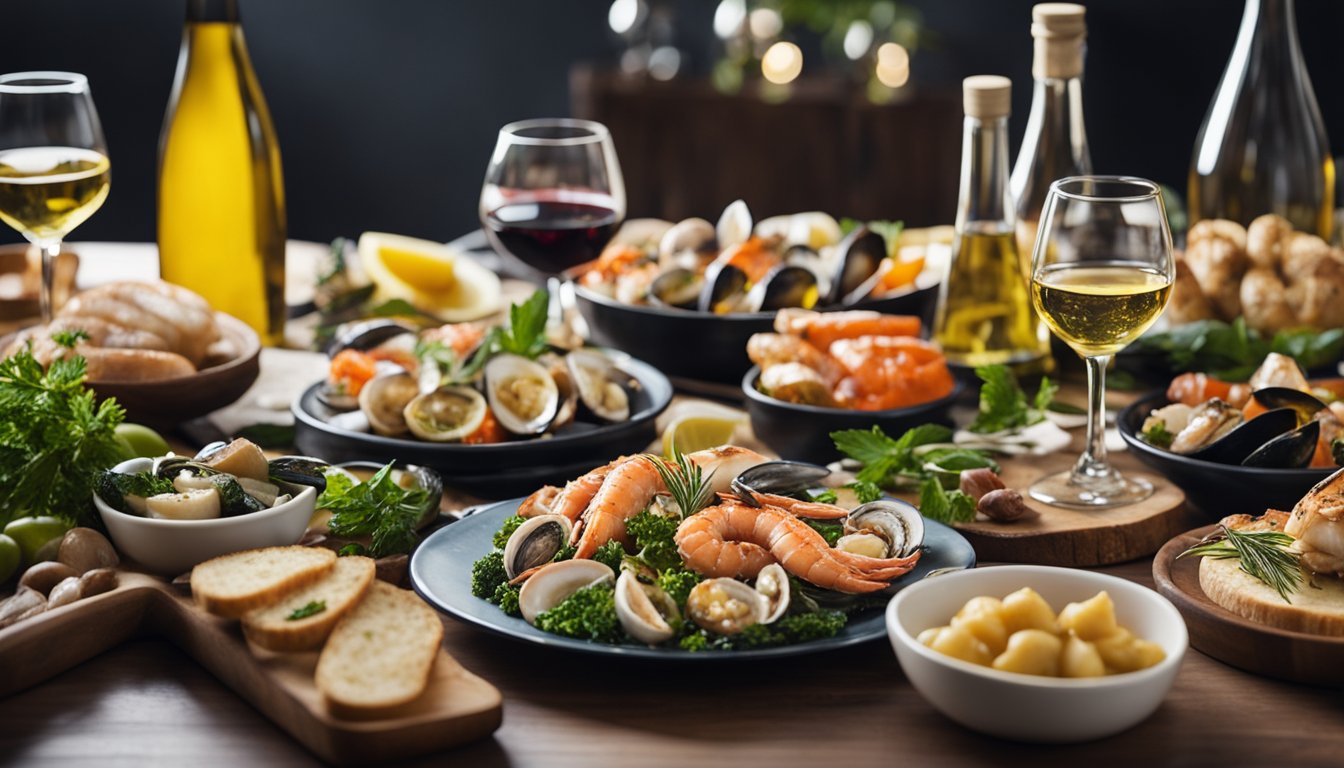
The core ingredients of Mediterranean cuisine serve as the backbone for its diverse flavors and textures. Staples such as tomatoes, garlic, legumes, whole grains, and nuts form the foundation of many recipes, combined expertly with various herbs and spices to create dishes brimming with flavor. Alongside these, freshly caught seafood and a moderate amount of dairy, poultry, and red meat round out the diet. While the recipes may vary from region to region, the underlying principle of using quality, fresh ingredients remains consistent. This reinforces the Mediterranean diet’s reputation for promoting well-being and longevity, with studies showing numerous health benefits related to its adoption.
Bringing Mediterranean cuisine into your own home kitchen is an adventure in both taste and healthy living. It’s not just about following recipes, but embracing an entire culinary tradition that values mealtime as a joyful and communal experience. The easy adaptability of many popular Mediterranean dishes allows for exploration and creativity. Furthermore, by integrating the principles of the Mediterranean diet into your regular dietary routine, you can make strides toward a more balanced and wholesome way of living.
Key Takeaways
- Mediterranean cuisine offers a diverse palate grounded in fresh, healthy ingredients.
- It’s rooted in history and culture, providing well-documented health benefits.
- Adopting its principles can be a flavorful journey to improved well-being.
Historical Roots and Cultural Influences
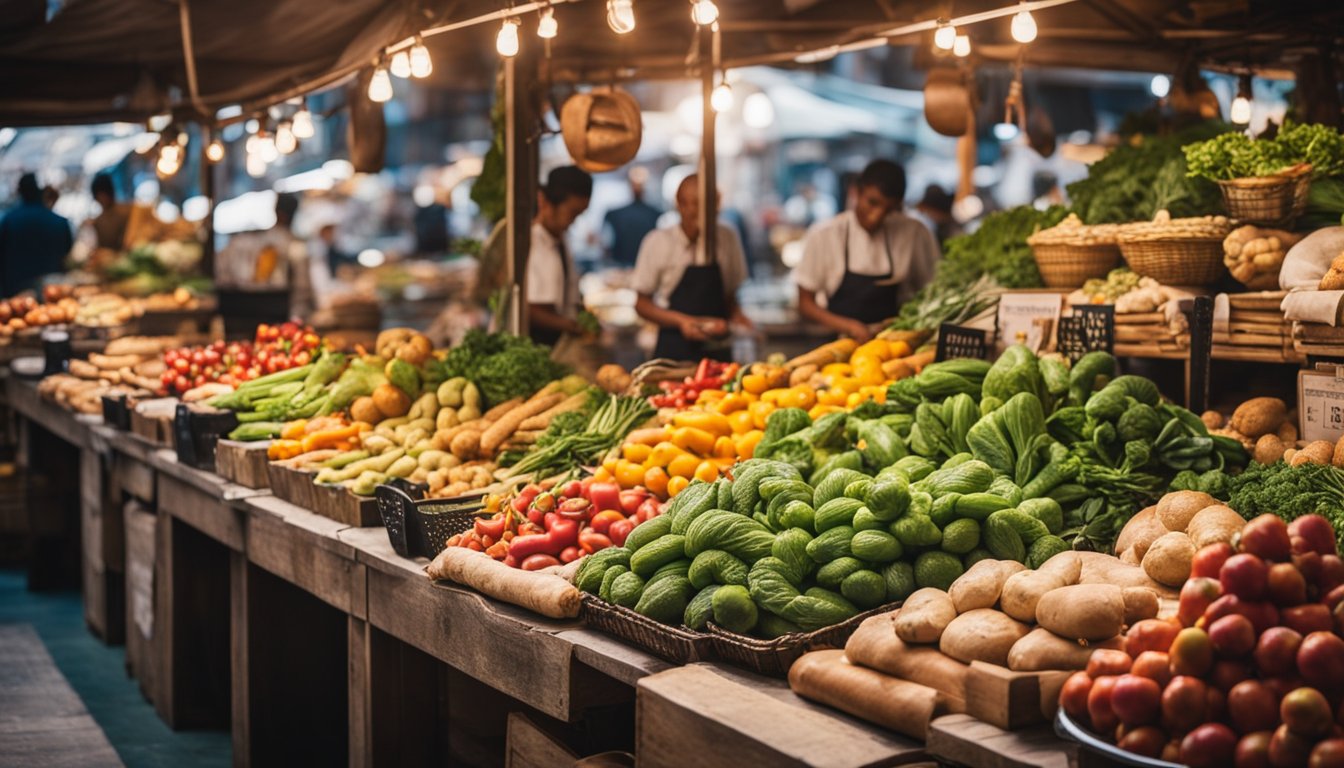
When you explore Modern Mediterranean Cuisine, you’ll uncover a rich tapestry of historical interactions and regional produce that has shaped today’s dishes. From the Mediterranean region’s olive groves to the Middle East’s bustling spice markets, each area has contributed defining elements to what you recognize as Mediterranean cuisine today. And it is fantastic that you can order all that at Aladdin Mediterranean Cuisine.
Mediterranean Region and Gastronomy
The Mediterranean region, encompassing the lands around the Mediterranean Sea, is the cradle of some of the world’s oldest cultures, each having a profound influence on the gastronomic traditions seen today. A cornerstone of your diet in this area is the olive, not just for its fruit but also for the olive oil that is a quintessential ingredient in Mediterranean food. The climate of the Mediterranean – mild, wet winters and hot, dry summers – is ideal for growing a variety of fruits and vegetables which are integral to the fresh, plant-based focus of the cuisine.
Influence of Greece, Spain, and Italy on Cuisine
Greece, Spain, and Italy each bring their unique flavors to Mediterranean cuisine.
- Greek culinary tradition is renowned for its use of fresh ingredients, including olives, cheeses (like feta), and herbs (oregano, thyme), which you’ll taste in dishes such as Greek salad and moussaka.
- Spain adds to the mix with its own culinary staples. The country is famous for tapas and paella, dishes that combine seafood and meats with locally grown produce like tomatoes and, once again, olives.
- Italian influence is unmistakable. Known for its pasta, cheeses (like Parmesan and mozzarella), and tomato-based sauces, Italy contributes dishes that have become synonymous with Mediterranean cuisine, including pizza and various pastas.
Middle East Contributions to Mediterranean Fare
Your understanding of Mediterranean cuisine would be incomplete without acknowledging the Middle East’s contributions. This region has introduced a variety of spices and techniques:
- Hummus, falafel, and kebabs have originated in Middle Eastern kitchens and are now staple items on Mediterranean menus.
- Spices such as cumin, cinnamon, and sumac add distinctive flavors that you can identify in the cuisine.
The seamless integration of these elements from the Middle East has helped shape the bold and savory profiles that you relish in Modern Mediterranean Cuisine.
Fundamentals of Mediterranean Ingredients
Mediterranean cuisine is characterized by its reliance on fresh, wholesome ingredients that are native to the region. Understanding these fundamental ingredients is essential to appreciating the depth of flavors and health benefits they offer.
Olive Oil: Liquid Gold of Mediterranean
Olive oil is the cornerstone of the Mediterranean diet, respected for both its flavor and health properties. It is used liberally in cooking, for dressing salads, and even as a dip for bread. The finest quality is extra virgin olive oil, known for its rich aroma and pure taste.
- Extra Virgin Olive Oil: Heart-healthy fat with a distinct taste.
- Virgin Olive Oil: Slightly less intense, suitable for cooking at higher temperatures.
Essential Vegetables and Fruits
The Mediterranean palette includes a vast array of colorful vegetables and fruits, each contributing vitamins, minerals, and fibers. Staples include:
- Vegetables: Tomatoes, eggplants, zucchini, and bell peppers.
- Fruits: Lemons, oranges, and figs provide vitamin C and sweetness.
These items are often consumed fresh, grilled, or incorporated into stews and salads.
Herbs and Spices: The Flavor Catalysts
Herbs and spices are integral to imparting the distinctive tastes found in Mediterranean dishes.
- Herbs: Fresh mint, dill, and parsley are frequently used.
- Spices: Cumin and coriander are staple spices that add depth.
They are used judiciously to enhance, rather than overpower, the natural flavors of the food.
Proteins: Meat, Fish, and Plant-Based Alternatives
Proteins in the Mediterranean diet are diverse, ranging from meats to legumes.
- Meat: Lamb and chicken are favored meats, often grilled or baked with herbs.
- Fish: Seafood is a primary source of protein, enjoyed for its freshness.
- Plant-Based: Lentils, beans, and chickpeas are vegetarian options rich in protein.
Nuts and seeds also provide additional protein and healthy fats.
Popular Mediterranean Dishes
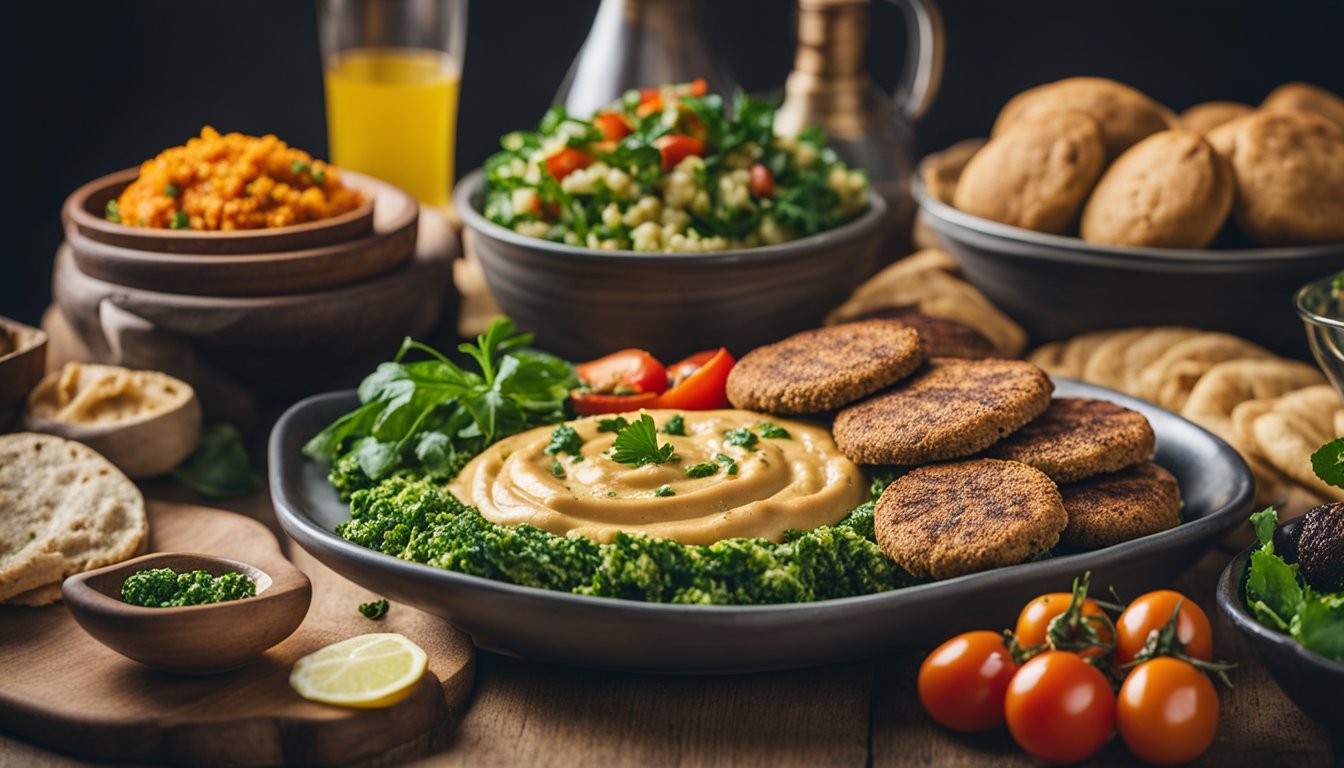
The Mediterranean region offers a diverse array of dishes, ranging from vibrant appetizers and salads to hearty main courses, complemented by delicate desserts. Each dish is steeped in tradition and rich in flavor.
The Quintessential Mediterranean Diet
The Mediterranean diet is renowned for its balance and health benefits. At its core, you’ll find plentiful vegetables, legumes, whole grains, and healthy fats. Hummus, a creamy blend of chickpeas, tahini, olive oil, lemon juice, and garlic, is a staple dip. Pita bread, often served alongside hummus, is essential for scooping up its richness. Greek salad combines crisp cucumbers, juicy tomatoes, tangy feta cheese, and Kalamata olives, simply dressed with olive oil and oregano.
Mouthwatering Appetizers and Salads
Your culinary journey might start with Falafel, deeply seasoned balls of ground chickpeas, fried to perfection. Salads play a pivotal role, with the Tabouli salad standing out. It blends finely chopped parsley, mint, tomato, and bulgur, with a refreshing citrus dressing.
Iconic Main Courses
When it comes to main dishes, Moussaka is a layered eggplant and mince, topped with a creamy béchamel sauce. Paella, traditionally from Spain, is a savory rice dish teeming with seafood, chicken, and a variety of spices. For pasta enthusiasts, Italian pasta dishes, such as spaghetti carbonara or penne arrabbiata, are essential. Don’t miss the savory Shakshuka, eggs poached in a cumin-scented tomato and pepper stew. Pizza, with its thin crust and fresh toppings, embodies the essence of Mediterranean flavors.
Desserts and Sweets: A Delicate Finish
End your meal on a sweet note with Mediterranean desserts. You may relish a slice of baklava, layers of phyllo dough filled with nuts and sweetened with honey. Alternatively, a simple yet satisfying bowl of fresh fruit could be the perfect conclusion to your Mediterranean feast.
Healthy Eating: Benefits of Mediterranean Cuisine
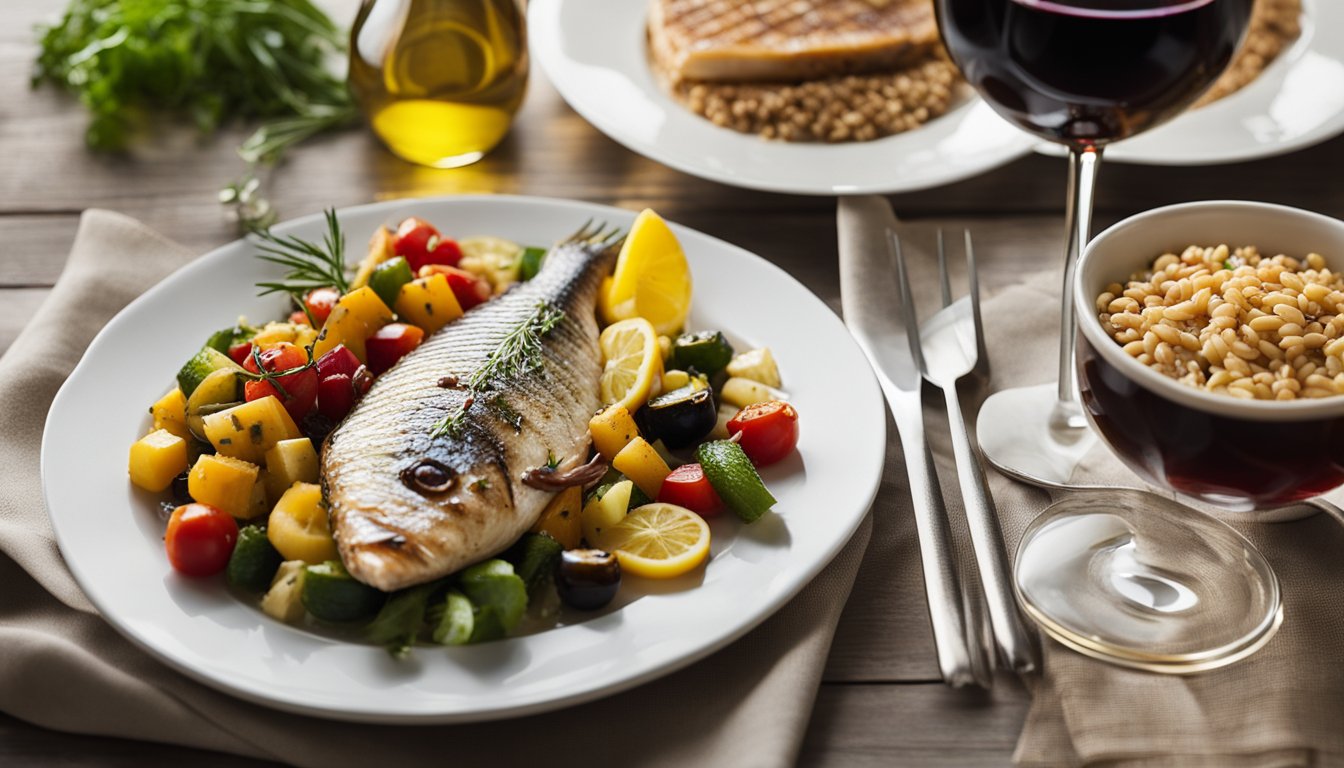
The Mediterranean diet emphasizes heart health and weight management through a balanced intake of wholesome foods, rich in essential nutrients.
Heart Health and Dietary Gains
The Mediterranean diet contributes to improved heart health by incorporating a variety of heart-healthy fats, primarily from olive oil, which is rich in monounsaturated fats and antioxidants. Studies show that these fats can lower the risk of heart disease.
- Olive Oil: A staple of the diet, olive oil is used instead of butter, promoting good cholesterol levels.
- Whole Grains: These are another essential part of the diet, offering fiber and B-vitamins that support heart health.
Including vegetarian options in your diet such as legumes, nuts, and seeds provides additional heart-protective nutrients like omega-3 fatty acids.
Weight Management and Wellness
Mediterranean cuisine promotes weight management by focusing on high-satiety foods that help maintain a healthy weight without extreme or restrictive dieting.
- Vegetables and Fruits: High in fiber and water content, they help you feel full and provide essential vitamins and minerals.
Regular consumption of Mediterranean meals can support overall wellness due to their healthy balance of macronutrients, contributing to sustained energy levels and preventing spikes in blood sugar.
Mediterranean Cooking at Home
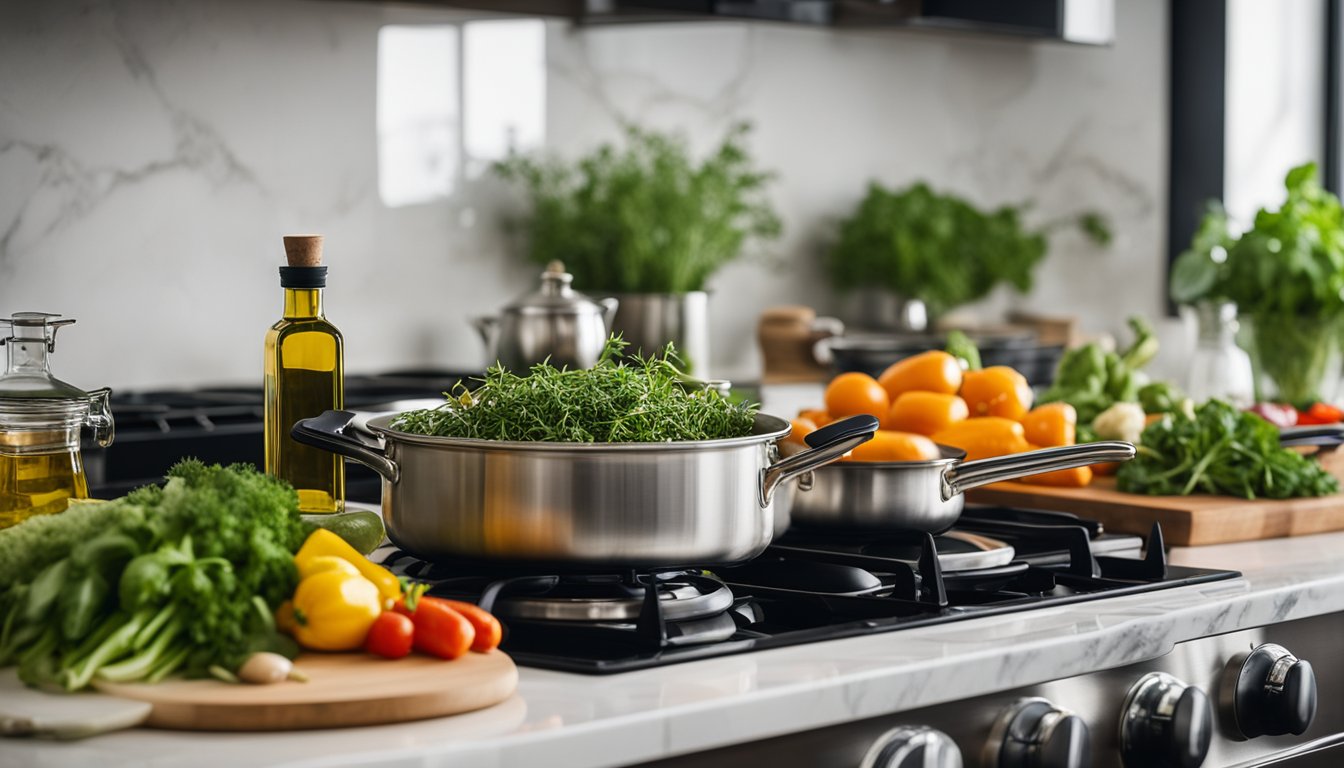
Adopting Mediterranean cooking at home involves mastering certain techniques, understanding the importance of fresh, seasonal ingredients, and creating the right atmosphere for dining. A good cookbook can be your guide to explore the vast array of delicious flavors this cuisine has to offer.
Essential Cooking Techniques
To truly embrace Mediterranean cuisine, familiarize yourself with sautéing, grilling, and roasting. These methods help in preserving the true flavors and textures of your ingredients. For instance, sautéing vegetables in a quality extra virgin olive oil not only enhances their flavor but also maintains their nutritional value.
- Sautéing: Keep the heat at medium, and use olive oil to create a crispy, golden texture without overcooking.
- Grilling: Perfect for fish and meat, grilling infuses a smoky flavor that’s typical in Mediterranean dishes.
- Roasting: Slow-roasting vegetables brings out their natural sweetness and creates a pleasant, tender texture.
Meal Planning and Seasonality
Your Mediterranean meals should revolve around the seasons, emphasizing the use of fresh herbs and seasonal vegetables. Planning meals weekly can help incorporate a variety of colors and nutrients into your diet, reflecting the diverse palette of Mediterranean dishes.
Season
Ingredients
Spring
Asparagus, Artichokes
Summer
Tomatoes, Bell Peppers
Fall
Eggplants, Root Vegetables
Winter
Cabbage, Citrus Fruits
Creating the Perfect Mediterranean Ambience
The ambiance of your dining space can enhance your Mediterranean culinary experience. Use simple, earthy table settings and ensure the lighting is warm to complement the vibrant colors of your dishes. Playing some Mediterranean music softly in the background can set the mood for a delightful culinary journey.
- Lighting: Soft, warm glow to mimic the Mediterranean sun.
- Music: Traditional tunes to immerse you in the cultural experience while dining.
Finding and Using a Good Cookbook
A well-curated cookbook can be invaluable in exploring Mediterranean cuisine and its myriad of recipes. Look for a cookbook that provides detailed information on the balance of flavors and one which educates you about the regional variations within Mediterranean cooking. Here are key features to consider:
- Authenticity: Recipes that stay true to the regional tastes.
- Inclusion of Olive Oil: Recipes should emphasize the use of olive oil as a core ingredient.
- Flavor Profiles: A good cookbook will help you understand how to balance and harmonize flavors in your dishes.
Frequently Asked Questions

In this section, you’ll find common inquiries about Modern Mediterranean Cuisine, covering topics from staple dishes to healthy eating principles.
What are some staple dishes in a Mediterranean diet?
Your Mediterranean diet features an array of staple dishes such as Greek salads, hummus, ratatouille, and tabbouleh. These dishes are rooted in fresh produce, grains, and legumes.
How can I incorporate more Mediterranean flavors into my meals?
To infuse Mediterranean flavors into your meals, use ingredients like olives, feta, lemon juice, and herbs such as oregano and rosemary. Cooking with olive oil is also fundamental to adding authentic flavor.
Which countries’ cuisines are represented in Mediterranean cooking?
Mediterranean cooking includes a diverse mix of cuisines from countries like Italy, Greece, Spain, France, and Morocco. Each cuisine brings its unique flavors and dishes to the Mediterranean table.
What are typical ingredients used in Mediterranean recipes?
Typical ingredients in Mediterranean recipes include olive oil, fresh vegetables, fruits, nuts, seeds, legumes, whole grains, fish, and lean meats. Seasonings like garlic, basil, and mint are common as well.
How do Mediterranean cuisine principles align with healthy eating guidelines?
Mediterranean cuisine emphasizes plant-based foods, healthy fats, whole grains, and lean proteins, aligning well with healthy eating guidelines. It encourages moderate consumption of dairy and red wine.
What are some quick and easy Mediterranean dinner ideas?
Quick and easy Mediterranean dinner ideas include Greek salad with grilled chicken, vegetable and bean stew, or whole-grain pasta with tomatoes, olives, and feta. These meals are both simple to prepare and nutritious.




Leave a Reply